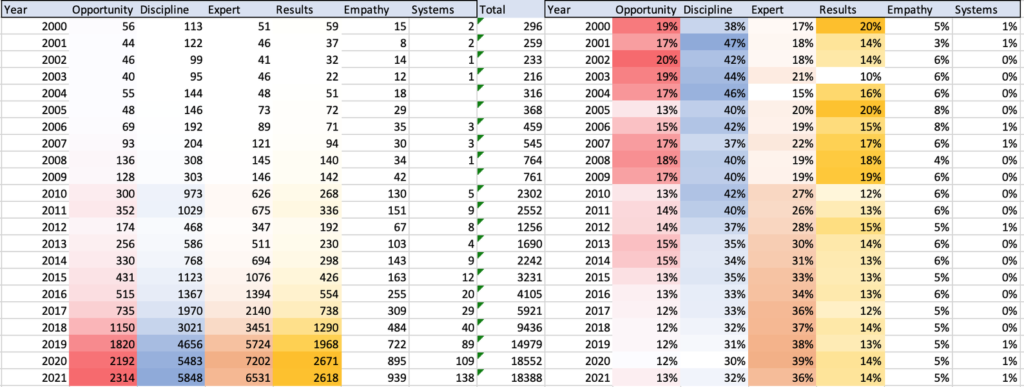Mindset hiring and Amazon. A shortfall of 1,427 Results driven leaders?

In today’s rapidly changing business landscape, it’s more important than ever for companies to prioritize the right mix of mindsets AND mindset capacity. According to recent McKinsey research and my own work at Stealth Dog Labs, companies that get both the business model and psychology of their teams right can yield a return on investment of 4.3 times compared to just 1.5 times for those that don’t.
But how can companies determine which employees have the mindset and potential to drive growth?
Combining the power of a search engine with an AI-driven digital psychologist, its possible to evaluate the mindset and thinking potential of an entire company or better yet, an ecosystem of vendors, leaders and even customers and competitors. By providing insights into mindset, this work serves as a powerful decision-making resource for business leaders seeking to optimize their hiring, promotion, and business model alignment strategies.
Through the use of “People Tetris” technology, Stealth Dog aims to assist talented individuals in breaking free from bad companies and guide them towards better ones. But it’s not just about helping individuals find the right fit; it’s also about helping companies identify the right people for their teams.
Even companies like Amazon, which have been highly successful in their own right, are not immune to the need for change. Amazon’s shift towards expert mindsets may have impacted the business in a powerful way, but it may be time to consider a greater focus on results-driven mindsets. This is especially important given the constantly evolving retail landscape.
In my earlier article about amazon hiring, note the number of people they have hired at the leadership level. Hiring 18,388 leaders in 2021 alone is staggering and give a sense of depth this company operates at. 5,848 are disciplined mindset by nature. 2,314 are opportunistic. Only 2,618 are Results driven. I would rather see this number higher than 4,100 not 2,618. That is a shortfall of 1,427 Results driven leaders.
Amazon in its early days was able to sustain 20% of the leadership team with a Results mindset “center of gravity” – that would be their normal day to day self. Clearly you see the trade-off between results driven mindsets prior to 2009 and a move towards expert mindset.
In conclusion, it is crucial for businesses looking to optimize their teams for growth and culture. By prioritizing the right mindsets and utilizing scalable remote data-driven insights, companies can position themselves for long-term success. The future is unpredictable, but with the right people and the right mindset, businesses can be better equipped to navigate whatever challenges come their way.